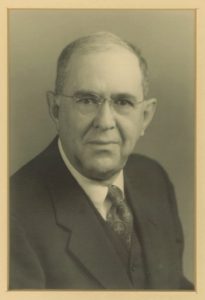Preston Epps
 Preston H. Epps (1888-1982) was born on the border of Virginia and North Carolina in an area then known as the High Plains of the Sappony Indians. He never knew his father, who was said to have died when he was very young, but was raised by his mother and maternal grandparents. In 1899 the family moved to Johnston County, NC, and then in late 1900 to Durham, where Epps went to work first for the Duke Tobacco Factory and then the Southern Railroad to help support his family. Epps’ had mother taught him to read from the Bible, but apart from six months of school when he was 12, he had no formal education until he was 21, when with the help of a local Baptist minister he persuaded the superintendent of the Durham school system to let him enroll in 7th grade. He graduated from Durham High School three years later, as president of the senior class.
Preston H. Epps (1888-1982) was born on the border of Virginia and North Carolina in an area then known as the High Plains of the Sappony Indians. He never knew his father, who was said to have died when he was very young, but was raised by his mother and maternal grandparents. In 1899 the family moved to Johnston County, NC, and then in late 1900 to Durham, where Epps went to work first for the Duke Tobacco Factory and then the Southern Railroad to help support his family. Epps’ had mother taught him to read from the Bible, but apart from six months of school when he was 12, he had no formal education until he was 21, when with the help of a local Baptist minister he persuaded the superintendent of the Durham school system to let him enroll in 7th grade. He graduated from Durham High School three years later, as president of the senior class.
Epps began teaching in the Department of Classics at UNC-Chapel Hill in 1915 as a graduate student and received his MA in English in 1917 with a thesis, “Studies in English Classicism in the Seventeenth Century.” By that time he had begun teaching at Boys High School in Atlanta (later renamed Henry W. Grady High School), where he taught from 1916 to 1928. Among his students there were W. Kendrick Pritchett, who went on to a highly distinguished career as a Greek epigrapher and historian at UC Berkeley, and Dean Rusk, the future US Secretary of State (1961-69), with whom he maintained a correspondence throughout his life. While at Boys High, Epps began doctoral work in Greek at the University of Chicago, studying under Paul Shorey. He received his PhD in 1928 with a dissertation entitled “The Place of Sparta in Greek History and Civilization.” He then joined the faculty at Furman University, where he remained for ten years (1928-38). He returned to UNC as a faculty member in 1938 and was named Kenan Professor of Greek in 1955, a post that he held until his retirement in 1961. In 1956 his former student Dean Rusk, then president of the Rockefeller Foundation, sent him to Greece to report to the Foundation on the excavations at the Athenian Agora; it was Epps’ first trip to the country that he had been studying for forty years.
His course load at UNC during his first fifteen years on the faculty was, by the current standards of a research university, prodigious, amounting to fifteen hours per semester. He was an engaging teacher and had a significant impact on his students, many of whom continued to remember him with affection and respect for years afterwards. Despite his heavy teaching load, he found time to publish a translation of Aristotle’s Poetics (UNC Press, 1942; reprinted 1970) and also revised a sourcebook of Greek literature originally published in 1924 by two of his senior colleagues, George Howe and Gustavus Adolphus Harrer (Greek Literature in Translation, Harper, 1948). After his retirement he published a translation of the Odyssey (Macmillan, 1965) and Thoughts from the Greeks (U. Missouri Press, 1970), in which he distilled the insights into Greek literature and culture that he had developed over the course of his long career. He and his wife continued to be presiding geniuses of the department until his death.